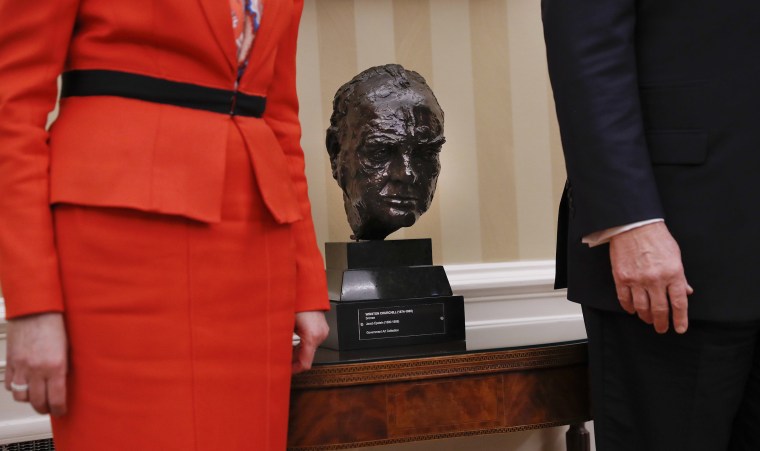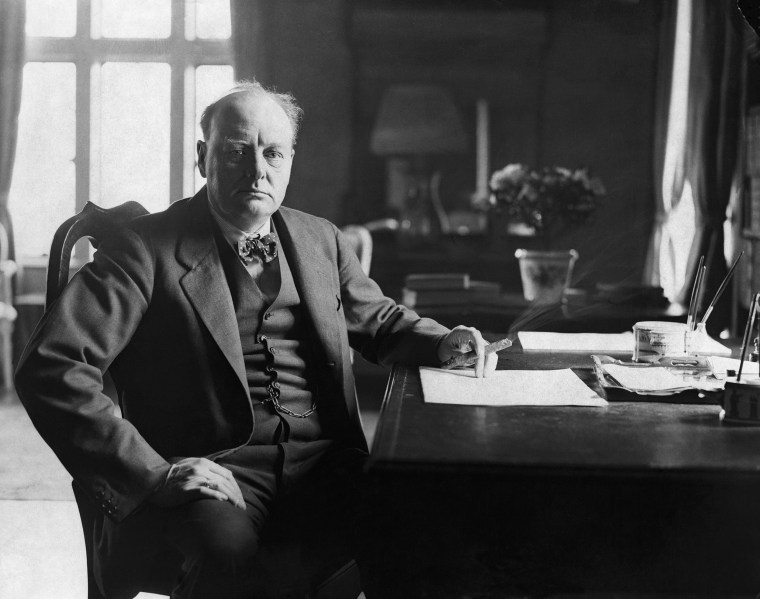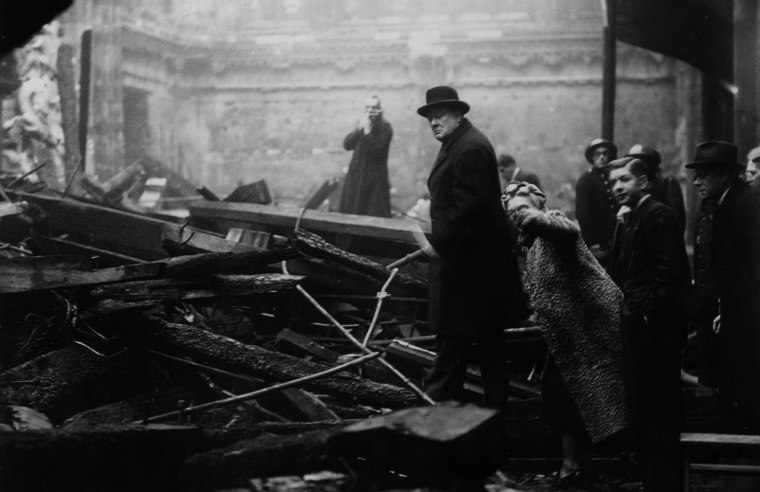This week, the White House has likened Donald Trump to Winston Churchill, the hard-drinking and eccentric prime minister who led Britain as it faced off against the Nazis during World War II.
Some historians have responded to that with a resounding: Mr. President, you're no Winston Churchill. Others, meanwhile, have raised Churchill's troubling record on race, saying the American president shouldn't try to emulate the British leader whose disturbing views on race were rooted in 19th-century colonialism.
Historian Warren Dockter, a lecturer in international politics at Aberystwyth University in Wales, has been among many to say the two leaders' actions couldn't be more different. Churchill helped unify Britain — in stark contrast to Trump, he said.
"By Churchill going out and being seen, it was an act of defiance against the Nazi oppression," he said, referring to the leader's visits with people in areas of London reduced to rubble in the German bombing blitz.
In contrast, Trump is "literally displacing people who are trying to exercise their freedom of speech in order to do this photoshoot," Dockter added, referring to the forcible clearing of peaceful protesters in front of the White House on Monday.
At a news conference Wednesday, White House press secretary Kayleigh McEnany defended Trump's actions, saying he was sending a message that America would overcome the recent unrest related to the death of George Floyd, a black man, while in police custody in Minneapolis after then-officer Derek Chauvin was seen on video digging his knee into Floyd's neck for more than eight minutes.
"We've seen presidents and leaders across the world who have had leadership moments and very powerful symbols that were important for our nation to see at any given time, to show a message of resilience and determination," McEnany said, giving the example of Churchill inspecting the bombing damage during the London Blitz. "It sent a powerful message of leadership to the British people."
Churchill, whose mother was American, has long been a subject of fascination in the United States, and his bust has sat in the White House for decades.
Trump has faced backlash from lawmakers and religious leaders — including the bishop of the Episcopal Diocese of Washington — after police used tear gas against demonstrators outside the White House to make way for a photo op at the nearby St. John's Episcopal Church, whose basement had earlier been set ablaze during the protests.
Former Secretary of Defense James Mattis criticized Trump on Wednesday, saying he was "the first president in my lifetime who does not try to unite the American people — does not even pretend to try. Instead, he tries to divide us." Military leaders and Defense Secretary Mark Esper have also spoken against Trump's calls for deploying troops in response to the protests.
The Trump-Churchill comparison "verges on obscenity," said the author Erik Larson, who recently published a book about Churchill during the war.
"Churchill wept on these visits; he offered compassion and hope, and helped people find their courage," Larson tweeted about Churchill's visits to communities destroyed by Germany bombs.
Similarly, Princeton historian Kevin Kruse said in a tweet that Churchill's efforts "showed resilience against the Nazi war machine."
Kruse summarized Monday's events as: "Trump wanted to pretend he wasn’t scared of his fellow citizens, so he had protesters gassed and a priest yanked from a church so he could pose outside it."

According to Richard Toye, a history professor at Britain's University of Exeter, Churchill had "many faults, but they weren’t anywhere as extreme as Trump’s faults.
"When Churchill was touring the bombed areas in WWII, he didn’t need the British people covered in tear gas in order for him to be able to do it."
There is also Churchill's darker history.
While he has been celebrated as a defender of democracy, his legacy is tainted by evidence of racism that present-day leaders wouldn't want to be compared with, said Toye, who is a co-author of an upcoming book "The Churchill Myths."
The former prime minister held white supremacist beliefs reflective of others in the era that people who were English speaking, and notably white, were superior, he said.
"This was linked to views of evolution," Toye said.
Citing examples of land grabbing from Native Americans in the West or from Palestinians in Israel, Toye said Churchill believed it was "actually being done in the interest of promoting a higher level of civilization and therefore he didn’t feel there was anything wrong with that."
Churchill supported the British Eugenics Society, a group that believed in improving humanity by the reproduction of those perceived the fittest or with desirable genetic traits, Dockter said.
Yet at the same time, he was seen as progressive in his earlier years, not using racial slurs in the same way as his contemporaries and advocating equal treatment of the Muslims and the Sikhs who fought for the British empire.
But even by the 1930s, his views had become outdated compared to the rest of society, Dockter said. As an imperialist, Churchill was vehemently opposed to Indian independence from British colonial rule. And some historians have argued Churchill even intentionally stoked the 1943 Bengal famine, which saw millions of Indians die, Dockter said.

Churchill was among a basket of oranges that McEnany compared to Trump's apple.
President George W. Bush throwing the first pitch of game three of the 2001 World Series following the 9/11 terrorist attacks and President Jimmy Carter's address to the nation during the energy crisis were other examples akin to Trump's leadership style, McEnany said.
By using those examples, Trump is trying to paint the protests as war and himself as a wartime president, Scott Lucas, a professor of American studies at England's University of Birmingham, said.
"This is someone who didn’t serve in the military, and we know why. This is someone who has always been insecure about those who served in the military," he said. "This is someone who wants to make himself a commander in wartime and he is willing to use the American people to do that."

